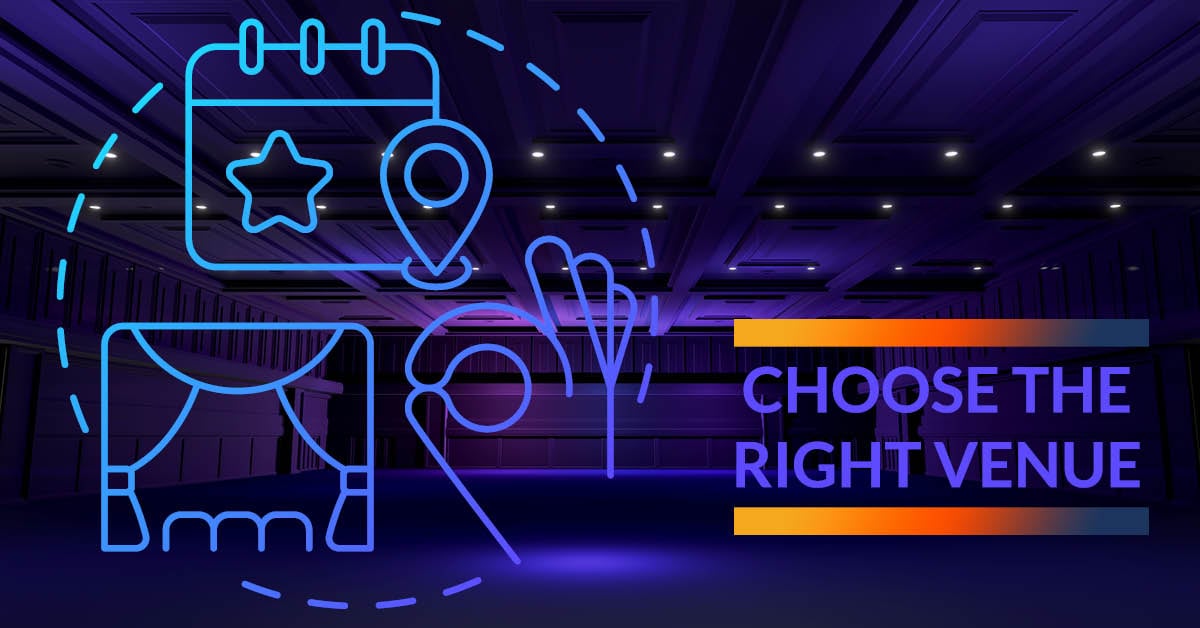5 Things to Look for in a Site Visit
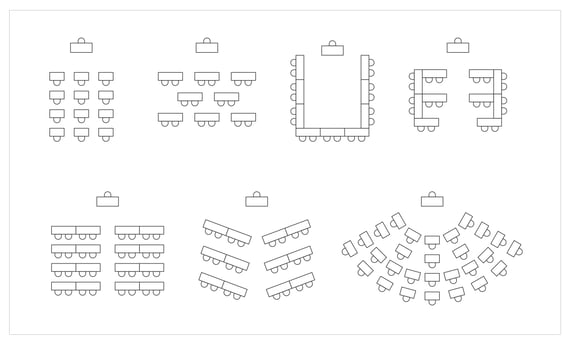
1. Room Capacity
Buyer beware: Don’t reserve a venue only to realize you cannot fit all your attendees.
The first problem starts with the fact that many venues are overly optimistic about their capacity. “We’ve never seen a case where the advertised room capacity is accurate with AV,” says Mankiewicz.
The second problem is one of planning-the capacity of a venue depends on what you intend to do with it. Will there be sit down dining? Networking and stand-up mingling?
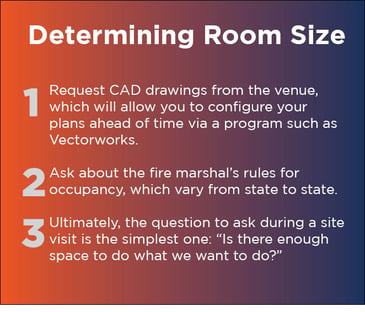
We've never seen a case where the advertised room capacity is accurate with AV.
Theater seating to watch a keynote speech? All these activities require different amounts of space. And once the stage, equipment, and technical team are installed space gets further reduced. Depending on your event activity, a ballroom that advertises a capacity as 500 may fit no more than 350. The same, of course goes for classrooms and breakout rooms.
2. Wayfinding & Signage Opportunities
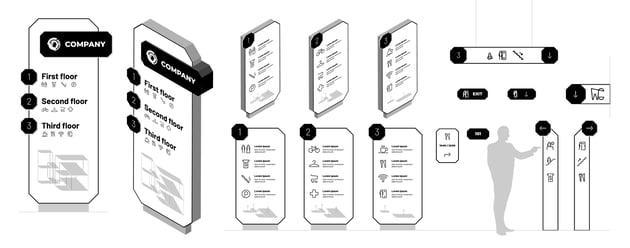 Wowing attendees means building an immersive branding experience from the moment they enter the venue. Not only does signage help with directions, but it’s also inspiring and unifying for everyone who attends.
Wowing attendees means building an immersive branding experience from the moment they enter the venue. Not only does signage help with directions, but it’s also inspiring and unifying for everyone who attends.
Your onsite visit, then, should include wayfinding discovery. What opportunities exist to get your message across? Will the hotel allow you to add “clings” to walls or windows? What about signage outside the venue, for example on flagpoles or a standalone sign on the sidewalk?
Will the hotel allow you to add "clings" to walls or windows? What about signage outside the venue, for example, flagpoles or a standalone sign on the sidewalk?
“FedEx is known for creating and installing event signage—and they often have an actual office in the larger hotels for this purpose,” Mankiewicz advises. “We usually walk around with the FedEx rep to get suggestions for where to hang banners and clings, as they know what has worked well before.”
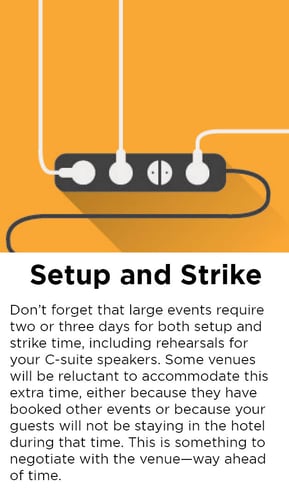
3. Power and Internet
Similar to room capacity, venues also often overestimate and overcharge for power needs. “In one case, we found that a hotel wanted to charge for 600 amps when our client only required 45 amps,” Mankiewicz recalls. “We were able to negotiate down to 100 amps, resulting in a big cost savings.” And the same goes for the internet.
Do your requirements match with what the hotel wants to charge you? Is there room to negotiate savings? Venue owners look out for their interests, and so should you.
4. Measure for Success
Simply put, some hotels are well equipped for hosting large events, while others are not. While CAD drawings of the venue are helpful, there are some key areas where you should go in and check for yourself:

Ballrooms and breakout rooms: Measure walls and truss points to double-check the accuracy of the CAD drawings. Ensure that ceiling heights are tall enough for sight lines and camera views and that chandeliers won’t be in the way. Are there other things that were not captured in the CAD drawing, such as mouse holes in the walls to run wires through? If not, you will have to run longer feeder cables through open doors, and then add ramps and other accommodations to avoid trip hazards and unsightliness.
Loading docks: Loading and unloading equipment is a major part of event planning. If your venue possesses loading docks, check to ensure they are compatible with your trucks and trailers—and don’t forget to measure the garage entrances. If there are no loading docks, you will need to rent a forklift to load and unload, adding time and expense. For certain hotels, you may even need a police detail to block the street so that your trailer can double-park and unload that way.
Elevator sizes: Like loading docks, the venue’s service elevators also need to be big enough to fit equipment and cases. If the elevators are too small, your team will need to unpack cases on the loading dock—a situation that adds both time and expense.
5. Management and Personnel
 Certain venues require union labor, which can be expensive. Additionally, a company such as Encore or an in-house AV provider may have exclusive rights to manage certain aspects of the production. If they do, you will have no choice but to work with them. “If union labor is required," Mankiewicz notes, “your vendors need to be able to work well with them.” It’s important to ask about labor requirements ahead of time, as this will add to your overall cost.
Certain venues require union labor, which can be expensive. Additionally, a company such as Encore or an in-house AV provider may have exclusive rights to manage certain aspects of the production. If they do, you will have no choice but to work with them. “If union labor is required," Mankiewicz notes, “your vendors need to be able to work well with them.” It’s important to ask about labor requirements ahead of time, as this will add to your overall cost.
Partnering Reduces the Risk
When it comes to event planning, your venue is the first and maybe the most important step in the process—except for choosing your event production partner. Engaging a production partner early in the process, and bringing them along to site visits, will help you negotiate with venues and develop a better understanding of what you need. “This is a process that often begins years in advance,” says Mankiewicz. “At Stagedge, for example, we’re currently helping clients vet contracts for 2025-2027.”
Engaging a production partner early in the process, and bringing them along to site visits, will help you negotiate with venues and develop a better understanding of what you need.
With 50 years in the industry, the Stagedge team knows the big venues, together with the challenges and advantages of each one. That's vital experience for when it comes to sizing a venue, navigating wayfinding, power, and internet, and negotiating with management and personnel. The perfect venue might be the first step to creating the perfect event, but the perfect event production partner can help you find it - and save you money along the way.
Got a question about a venue? Contact us
--
Stagedge: Creating Immersive Experiences for 50 years is proud to be one of Boston's premier full-service event production companies dedicated to conceiving, creating, and executing immersive brand experiences through live, virtual & hybrid events, domestically, and worldwide.
This article is also available in a chapter from our latest resource guide:
The Stagedge Events Playbook
You can navigate directly to view more topics or download the Playbook in its entirety for free.
